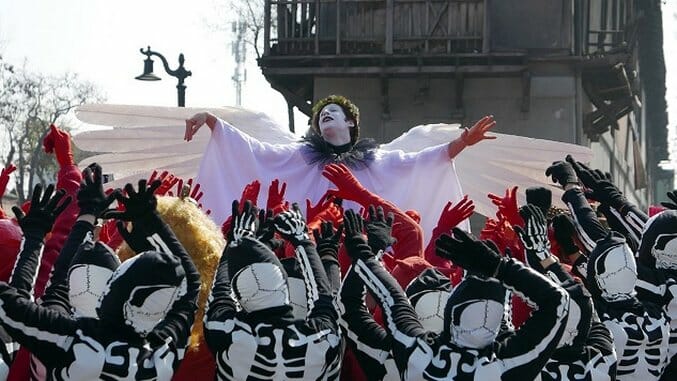Endless Poetry

It’s tempting to describe Alejandro Jodorowsky’s latest semi-autobiographical opus, Endless Poetry, as approachable, perhaps even accessible, but that wouldn’t be precise. The truth is that the film is as heady as it is lucid; the more familiar you are with Jodorowsky and his work, the better you’ll vibe with Endless Poetry, but if the sum total of your experience with his enchanting surrealism amounts to exactly nada, it won’t shut you out, either. This is something of a miracle, being as Endless Poetry picks up right where Jodorowsky’s previous film, 2013’s The Dance of Reality, left off, not quite in media res, but close enough that it ought to be puzzling.
The puzzlement comes later, though, much later, and when it does it isn’t confounding as much as it’s merely bizarre. Jodorowsky’s trademark peculiarities pop up in Endless Poetry’s every frame, of course, but they’re buttressed by a cohesion the films of his early career roundly reject: He’s speaking in language that’s direct but also flowery, metaphysical, rife with allusions and illusions, peppered by truly purple poetics, but his grander flourishes maintain coherence even at their loftiest. Endless Poetry is a journey on which we encounter characters who sing all of their lines, in continuance with The Dance of Reality, who drench themselves in paint and hurl their bodies at blank canvases, who profess love through puppetry; we see men gut each other on the streets, parades celebrating fascism, carnivals of devils and skeletons, and grey-tinged cafes staffed by elderly waiters serving tables in as ponderous a fashion as possible.
It’s also a story about a young man trying like hell to escape from his unhappy home, who would rather read poetry than study biology at his brutal father’s command. Two actors play the young man, Alejandro, at two stages of his life, Jeremias Herskovits as a teenager, Adan Jodorowsky as an emerging adult. In case the shared surnames don’t give it away, Adan is Alejandro’s own son, handsome, lively, adroit as a physical performer: He communicates to us with his eyes and with gesture, as often as he does with words. Furthering Endless Poetry’s identity as a family affair is the presence of Brontis Jodorowsky, Alejandro’s older son, reprising his role in The Dance of Reality as Jaime alongside Pamela Flores, cast in the dual role of Sara, Alejandro’s mother, and Stella Díaz Varín, first his muse and then his lover.
So maybe Endless Poetry is a little more slippery than I’m giving it credit for, at least in terms of casting and logistics. The film contains a critical mass of Jodorowskys, plus a whole lot of spillover from The Dance of Reality, and on top of that, Alejandro front loads it with a torrent of naked artifice: You’re watching theater of a sort, where stagehands decked out in black from head to toe repeatedly intervene with the drama unfolding before us, plucking props out of the frame and replacing them with new ones, building the facade of new sets upon old sets right before our very eyes. They’re characters unto themselves, though Jodorowsky doesn’t pay them any mind. He sees them only as instruments in the orchestration of his cinematic aria.
-

-

-

-

-

-

-

-

-

-

-

-

-

-

-

-

-

-

-

-

-

-

-

-

-

-

-

-

-

-

-

-

-

-

-

-

-

-

-

-








































